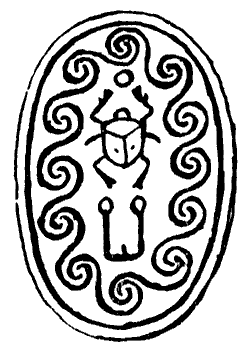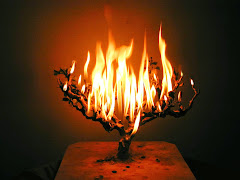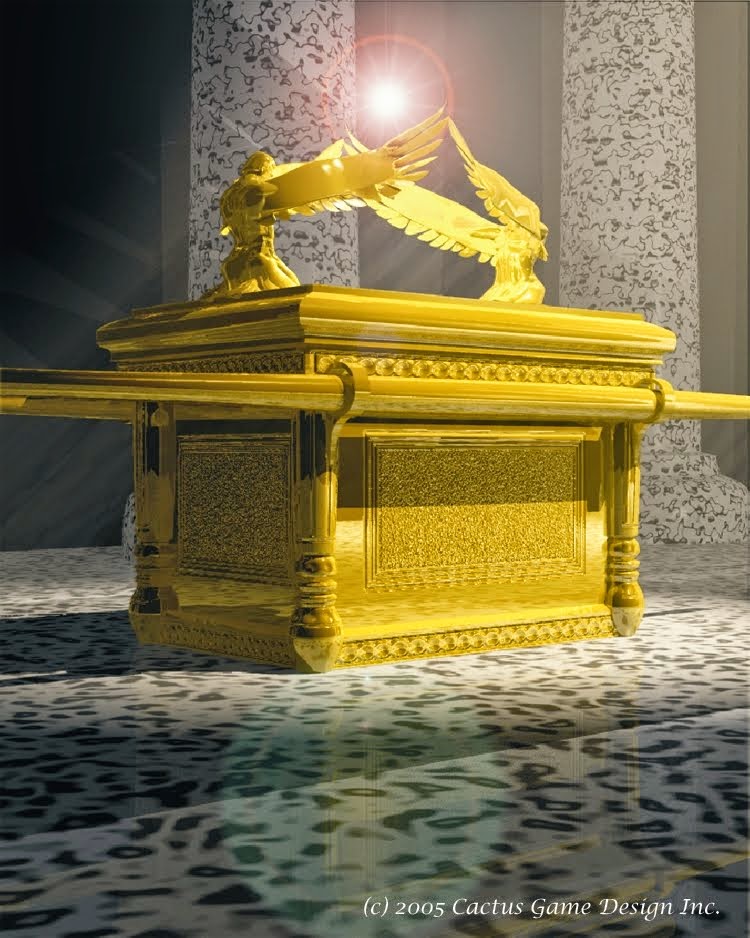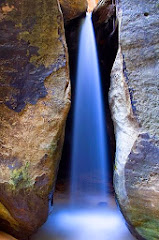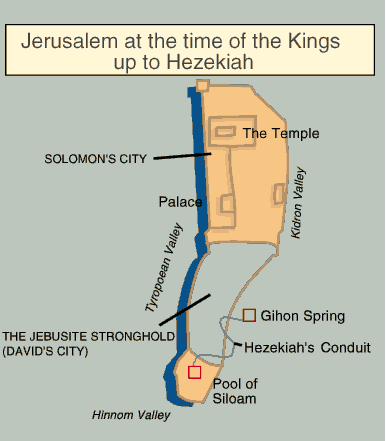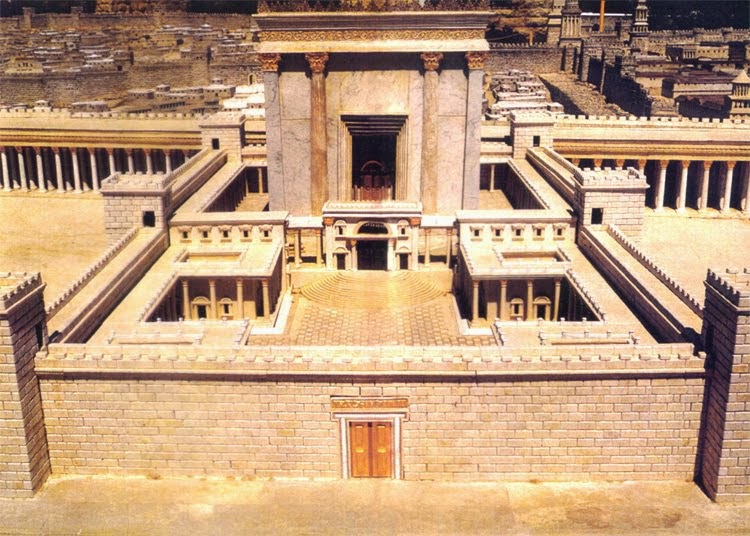.
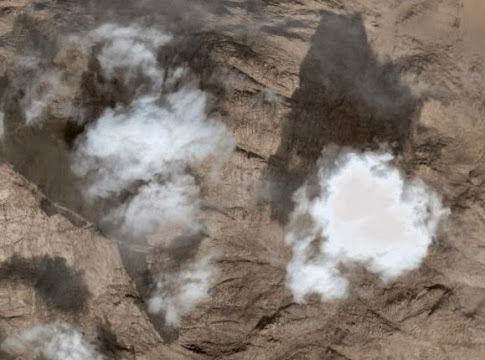
Mt. Sinai, satelite image
Glory, Potency and Veils
Through the story of Moses in Exodus we have the earliest accounts, indeed the first intimations of the effects of the power of the Holy Spirit within Those that manifest it in its most supreme potency. The law of God, the Ark of the Covenant, the shaping of the Hebrews as the Chosen People are fruits of revelation through Moses we are all familiar with. Accustomed as we are of the iconographic images of Moses descending from Mt. Sinai with the revealed law of God, our imagination usually stops there. But there is more to the story that heightens the wonder and mystery of it all.
"And the LORD said unto Moses, 'Write thou these words: for after the tenor of these words I have made a covenant with thee and with Israel.'
"And he was there with the LORD forty days and forty nights; he did neither eat bread, nor drink water. And he wrote upon the tables the words of the covenant, the ten commandments.
"And it came to pass, when Moses came down from mount Sinai with the two tables of testimony in Moses' hand, when he came down from the mount, that Moses wist not that the skin of his face shone while he talked with him. And when Aaron and all the children of Israel saw Moses, behold, the skin of his face shone; and they were afraid to come nigh him.
"And Moses called unto them; and Aaron and all the rulers of the congregation returned unto him: and Moses talked with them. And afterward all the children of Israel came nigh: and he gave them in commandment all that the LORD had spoken with him in mount Sinai. And till Moses had done speaking with them, he put a vail on his face.
"But when Moses went in before the LORD to speak with him, he took the vail off, until he came out. And he came out, and spake unto the children of Israel that which he was commanded. And the children of Israel saw the face of Moses, that the skin of Moses' face shone: and Moses put the vail upon his face again, until he went in to speak with him." (Exodus 34:28-35)
Deuteronomy, the final book of the Pentateuch (the first five books of the Bible) we have a verse that is very suggestive as to the cause of the radiant face of Moses. Written about the fifteenth century before Christ, it tells us: "And there arose not a prophet since in Israel like unto Moses, whom the LORD knew face to face" (Deuteronomy 34:10)
The transfiguration of Jesus is like this. Furthermore, the care Jesus took in showing it is not unlike the care Moses took in choosing to wear or not wear the veil. Of the Apostles, Jesus took only Peter, James and John to witness the spiritual potency latent in His being.
"And after six days Jesus taketh Peter, James, and John his brother, and bringeth them up into an high mountain apart, And was transfigured before them: and his face did shine as the sun, and his raiment was white as the light. And, behold, there appeared unto them Moses and Elias talking with him.
"Then answered Peter, and said unto Jesus, 'Lord, it is good for us to be here: if thou wilt, let us make here three tabernacles; one for thee, and one for Moses, and one for Elias.' While he yet spake, behold, a bright cloud overshadowed them: and behold a voice out of the cloud, which said, 'This is my beloved Son, in whom I am well pleased; hear ye him.' And when the disciples heard it, they fell on their face, and were sore afraid. And Jesus came and touched them, and said, 'Arise, and be not afraid.'" (Matthew 17:1-7)
In the life of Baha'u'llah, we also find accounts of this spiritual phenomenon. Here is an excerpt of the observations from one follower named Haji Mirza Haydar-Ali who had spent much time with Baha'u'llah.
"Some people asked permission to attain His presence
for the sole purpose of conducting arguments and engaging
in controversies. As a favour on His part, and in order
to fulfil the testimony and to declare conclusively the
proofs, He gave these permission to enter the court of
His majesty and glory. As they entered the room, heard
His voice welcoming them in, and gazed at His countenance
beaming with the light of grandeur, they could
not help but prostrate themselves at His door. They would
then enter and sit down. When He showed them where
to sit, they would find themselves unable to utter a word
or put forward their questions. When they left they would
bow to Him involuntarily. Some would be transformed
through the influence of meeting Him and would leave
with the utmost sincerity and devotion, some would
depart as admirers, while others would leave His presence,
ignorant and heedless, attributing their experience to pure
sorcery." (Adib Taherzadeh, The Revelation of Baha'u'llah v 3, p. 248)
for the sole purpose of conducting arguments and engaging
in controversies. As a favour on His part, and in order
to fulfil the testimony and to declare conclusively the
proofs, He gave these permission to enter the court of
His majesty and glory. As they entered the room, heard
His voice welcoming them in, and gazed at His countenance
beaming with the light of grandeur, they could
not help but prostrate themselves at His door. They would
then enter and sit down. When He showed them where
to sit, they would find themselves unable to utter a word
or put forward their questions. When they left they would
bow to Him involuntarily. Some would be transformed
through the influence of meeting Him and would leave
with the utmost sincerity and devotion, some would
depart as admirers, while others would leave His presence,
ignorant and heedless, attributing their experience to pure
sorcery." (Adib Taherzadeh, The Revelation of Baha'u'llah v 3, p. 248)
Baha'u'llah, Himself, alluded to this. In one of His personal prayers He is moved to acknowledge this potency of God's spirit through Him.
"I swear by Thy glory! Tribulations, however woeful, can never hinder me from remembering Thee or from celebrating Thy praise. Every vexation borne for love of Thee is a token of Thy mercy unto Thy creatures, and every ordeal suffered in Thy path is but a gift from Thee bestowed on Thy chosen ones. I testify that my countenance, which shineth above the Day-Spring of eternity, hath been irradiated by adversity, and my body hath been adorned by it before all who are in heaven and all who are on earth." (Baha'u'llah, Prayers and Meditations by Baha'u'llah, pp. 218-19)
.
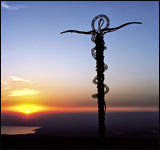
Staff of Moses, sculpture on Mt. Nebo, Jordan
How Goest Moses
"And Moses was learned in all the wisdom of the Egyptians, and was mighty in words and in deeds. And when he was full forty years old, it came into his heart to visit his brethren the children of Israel. And seeing one of them suffer wrong, he defended him, and avenged him that was oppressed, and smote the Egyptian: For he supposed his brethren would have understood how that God by his hand would deliver them: but they understood not.
"And the next day he shewed himself unto them as they strove, and would have set them at one again, saying, 'Sirs, ye are brethren; why do ye wrong one to another?' But he that did his neighbour wrong thrust him away, saying, 'Who made thee a ruler and a judge over us? Wilt thou kill me, as thou diddest the Egyptian yesterday?' Then fled Moses at this saying, and was a stranger in the land of Madian, where he begat two sons." (Acts 7:22-29)
"This Moses whom they refused, saying, 'Who made thee a ruler and a judge?' the same did God send to be a ruler and a deliverer by the hand of the angel which appeared to him in the bush." (Acts: 7:35)
This account of the slaying of an Egyptian by Moses is written by St. Luke in the Acts of the Apostles, found in the New Testament. The reader will note that Luke presents this as a defense of another and not an outright murder as detractors are fond of doing. The account St. Luke is referring to is as follows from Exodus.
"And it came to pass in those days, when Moses was grown, that he went out unto his brethren, and looked on their burdens: and he spied an Egyptian smiting an Hebrew, one of his brethren. And he looked this way and that way, and when he saw that there was no man, he slew the Egyptian, and hid him in the sand." (Exodus 2:11-12)
This incident is what theologians call a "skandalon", a stumbling block to faith that is a part of the story of all holy messengers. How we deal with a skandalon is a test of our faith and calls into question how we approach God's revelations. If we look to the Exodus account of Moses slaying of an Egyptian and stop there, allowing our doubts and skepticism to shade or even negate the good that Moses achieved, we deprive ourselves of God's gifts through Moses. But, if we reserve judgment, we may find our way to St. Luke and find more to the story that changes our outlook. Such are the trials in our search for truth, such are the tests given to us in examining any of God's Messengers. The test is of our hearts, and it is ours to pass or fail.
What's more, this common skandalon of Moses misdirects many from the true answer to the question of the prohibition of Moses in entering Canaan. Many are certain it was because of the alleged murder of a man by Moses. Here is what is said in Numbers, then Deuteronomy.
"And the LORD spake unto Moses, saying, 'Take the rod, and gather thou the assembly together, thou, and Aaron thy brother, and speak ye unto the rock before their eyes; and it shall give forth his water, and thou shalt bring forth to them water out of the rock: so thou shalt give the congregation and their beasts drink.'
"And Moses took the rod from before the LORD, as he commanded him. And Moses and Aaron gathered the congregation together before the rock, and he said unto them, 'Hear now, ye rebels; must we fetch you water out of this rock?' And Moses lifted up his hand, and with his rod he smote the rock twice: and the water came out abundantly, and the congregation drank, and their beasts also." (Numbers 20:7-10)
The reader will see that Moses is commanded to speak to the rock to bring forth water for the thirsting of the Hebrews. However, Moses struck the rock.
"And the LORD spake unto Moses that selfsame day, saying, 'Get thee up into this mountain Abarim, unto mount Nebo, which is in the land of Moab, that is over against Jericho; and behold the land of Canaan, which I give unto the children of Israel for a possession: And die in the mount whither thou goest up, and be gathered unto thy people; as Aaron thy brother died in mount Hor, and was gathered unto his people: Because ye trespassed against me among the children of Israel at the waters of MeribahKadesh, in the wilderness of Zin; because ye sanctified me not in the midst of the children of Israel. Yet thou shalt see the land before thee; but thou shalt not go thither unto the land which I give the children of Israel.'" (Deuteronomy 32:48-52)
Here is another skandalon. We see up to now, only the relationship of God and Messenger and conclude the difficulty lies there. But Moses, as with Jesus Who is to come later, assumes a burden. We can remember the prayer of Christ at Gethsemane in which He beseeches God: "And he said, Abba, Father, all things are possible unto thee; take away this cup from me: nevertheless not what I will, but what thou wilt." (Mark 14:36, see also Matthew 26:39). Thereafter was Christ's life cut off, crucified for our sake.
Moses likewise beseeched God, for He was prohibited from Canaan. We have read of that long ago day, described in the book of Numbers, when He was to address the rock and bring forth water, He addressed the people, admonishing them for their rebelliousness. The reader will see in the following passage from Deuteronomy that the Lord was wroth with Moses for His people's sake.
"And I besought the LORD at that time, saying, 'O Lord GOD, thou hast begun to shew thy servant thy greatness, and thy mighty hand: for what God is there in heaven or in earth, that can do according to thy works, and according to thy might? I pray thee, let me go over, and see the good land that is beyond Jordan, that goodly mountain, and Lebanon.'
"But the LORD was wroth with me for your sakes, and would not hear me: and the LORD said unto me, 'Let it suffice thee; speak no more unto me of this matter. Get thee up into the top of Pisgah, and lift up thine eyes westward, and northward, and southward, and eastward, and behold it with thine eyes: for thou shalt not go over this Jordan.'" (Deuteronomy 3:23-27)
.
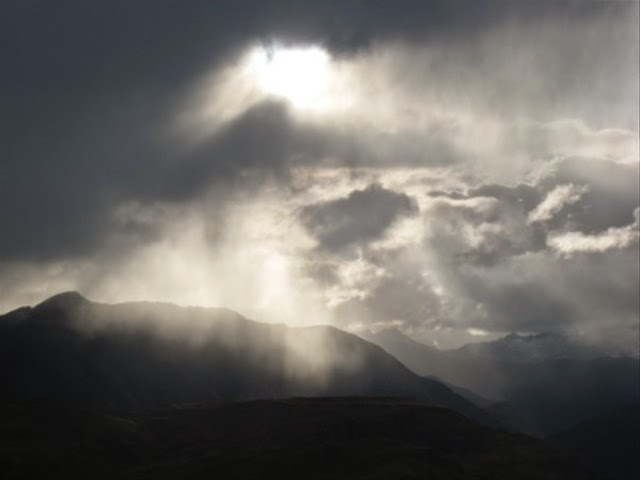
The Voice
"And the LORD said unto Moses, 'Go unto the people, and sanctify them to day and to morrow, and let them wash their clothes, And be ready against the third day: for the third day the LORD will come down in the sight of all the people upon mount Sinai. And thou shalt set bounds unto the people round about, saying, Take heed to yourselves, that ye go not up into the mount, or touch the border of it: whosoever toucheth the mount shall be surely put to death: There shall not an hand touch it, but he shall surely be stoned, or shot through; whether it be beast or man, it shall not live: when the trumpet soundeth long, they shall come up to the mount.'
"And Moses went down from the mount unto the people, and sanctified the people; and they washed their clothes. And he said unto the people, 'Be ready against the third day: come not at your wives.'
"And it came to pass on the third day in the morning, that there were thunders and lightnings, and a thick cloud upon the mount, and the voice of the trumpet exceeding loud; so that all the people that was in the camp trembled. And Moses brought forth the people out of the camp to meet with God; and they stood at the nether part of the mount. And mount Sinai was altogether on a smoke, because the LORD descended upon it in fire: and the smoke thereof ascended as the smoke of a furnace, and the whole mount quaked greatly. And when the voice of the trumpet sounded long, and waxed louder and louder, Moses spake, and God answered him by a voice.
"And the LORD came down upon mount Sinai, on the top of the mount: and the LORD called Moses up to the top of the mount; and Moses went up. And the LORD said unto Moses, 'Go down, charge the people, lest they break through unto the LORD to gaze, and many of them perish. And let the priests also, which come near to the LORD, sanctify themselves, lest the LORD break forth upon them.'
"And Moses said unto the LORD, 'The people cannot come up to mount Sinai: for thou chargedst us, saying, Set bounds about the mount, and sanctify it.' And the LORD said unto him, 'Away, get thee down, and thou shalt come up, thou, and Aaron with thee: but let not the priests and the people break through to come up unto the LORD, lest he break forth upon them.'
"So Moses went down unto the people, and spake unto them. And God spake all these words, saying, 'I am the LORD thy God, which have brought thee out of the land of Egypt, out of the house of bondage.'
'Thou shalt have no other gods before me.'
'Thou shalt not make unto thee any graven image, or any likeness of any thing that is in heaven above, or that is in the earth beneath, or that is in the water under the earth.'
'Thou shalt not bow down thyself to them, nor serve them: for I the LORD thy God am a jealous God, visiting the iniquity of the fathers upon the children unto the third and fourth generation of them that hate me; And shewing mercy unto thousands of them that love me, and keep my commandments.'
'Thou shalt not take the name of the LORD thy God in vain; for the LORD will not hold him guiltless that taketh his name in vain.'
'Remember the sabbath day, to keep it holy. Six days shalt thou labour, and do all thy work: But the seventh day is the sabbath of the LORD thy God: in it thou shalt not do any work, thou, nor thy son, nor thy daughter, thy manservant, nor thy maidservant, nor thy cattle, nor thy stranger that is within thy gates: For in six days the LORD made heaven and earth, the sea, and all that in them is, and rested the seventh day: wherefore the LORD blessed the sabbath day, and hallowed it.'
'Honour thy father and thy mother: that thy days may be long upon the land which the LORD thy God giveth thee.'
'Thou shalt not kill.'
'Thou shalt not commit adultery.'
'Thou shalt not steal.'
'Thou shalt not bear false witness against thy neighbour.'
'Thou shalt not covet thy neighbour's house, thou shalt not covet thy neighbour's wife, nor his manservant, nor his maidservant, nor his ox, nor his ass, nor any thing that is thy neighbour's.'
'Thou shalt have no other gods before me.'
'Thou shalt not make unto thee any graven image, or any likeness of any thing that is in heaven above, or that is in the earth beneath, or that is in the water under the earth.'
'Thou shalt not bow down thyself to them, nor serve them: for I the LORD thy God am a jealous God, visiting the iniquity of the fathers upon the children unto the third and fourth generation of them that hate me; And shewing mercy unto thousands of them that love me, and keep my commandments.'
'Thou shalt not take the name of the LORD thy God in vain; for the LORD will not hold him guiltless that taketh his name in vain.'
'Remember the sabbath day, to keep it holy. Six days shalt thou labour, and do all thy work: But the seventh day is the sabbath of the LORD thy God: in it thou shalt not do any work, thou, nor thy son, nor thy daughter, thy manservant, nor thy maidservant, nor thy cattle, nor thy stranger that is within thy gates: For in six days the LORD made heaven and earth, the sea, and all that in them is, and rested the seventh day: wherefore the LORD blessed the sabbath day, and hallowed it.'
'Honour thy father and thy mother: that thy days may be long upon the land which the LORD thy God giveth thee.'
'Thou shalt not kill.'
'Thou shalt not commit adultery.'
'Thou shalt not steal.'
'Thou shalt not bear false witness against thy neighbour.'
'Thou shalt not covet thy neighbour's house, thou shalt not covet thy neighbour's wife, nor his manservant, nor his maidservant, nor his ox, nor his ass, nor any thing that is thy neighbour's.'
"And all the people saw the thunderings, and the lightnings, and the noise of the trumpet, and the mountain smoking: and when the people saw it, they removed, and stood afar off. And they said unto Moses, 'Speak thou with us, and we will hear: but let not God speak with us, lest we die.' And Moses said unto the people, 'Fear not: for God is come to prove you, and that his fear may be before your faces, that ye sin not.'
"And the people stood afar off, and Moses drew near unto the thick darkness where God was. And the LORD said unto Moses, 'Thus thou shalt say unto the children of Israel, Ye have seen that I have talked with you from heaven.'" (Exodus 9:10-20-22)
.
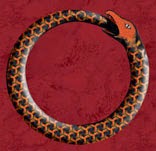
Worm Ouroborus ("Snake Eating its Own Tail, an ages-old symbol of the universe)
Serpents of God
Jesus gave a great and positive lesson about the serpent in this advice: "Behold, I send you forth as sheep in the midst of wolves: be ye therefore wise as serpents, and harmless as doves." (Matthew: 10:16)
This is significant when we ponder the typically unexamined image of the serpent as evil. When we study holy text it is hazardous to apply a lesson learned in one context to generalized assumptions. This is one point about scripture study that must be rendered into a principle; that is, that before drawing conclusions about any idea or concept in sacred literature, the idea or concept must be examined in all its contexts in the sacred text. From Moses, we have two examples of why this is essential in the following stories from the books of Exodus and Numbers.
"'And I am sure that the king of Egypt will not let you go, no, not by a mighty hand. And I will stretch out my hand, and smite Egypt with all my wonders which I will do in the midst thereof: and after that he will let you go. And I will give this people favour in the sight of the Egyptians: and it shall come to pass, that, when ye go, ye shall not go empty. But every woman shall borrow of her neighbour, and of her that sojourneth in her house, jewels of silver, and jewels of gold, and raiment: and ye shall put them upon your sons, and upon your daughters; and ye shall spoil the Egyptians.'
"And Moses answered and said, 'But, behold, they will not believe me, nor hearken unto my voice: for they will say, The LORD hath not appeared unto thee.' And the LORD said unto him, 'What is that in thine hand?' And he said, A rod. And he said, 'Cast it on the ground.' And he cast it on the ground, and it became a serpent; and Moses fled from before it.
"And the LORD said unto Moses, 'Put forth thine hand, and take it by the tail.' And he put forth his hand, and caught it, and it became a rod in his hand: 'That they may believe that the LORD God of their fathers, the God of Abraham, the God of Isaac, and the God of Jacob, hath appeared unto thee.' (Exodus 3:19-4:5)
"And the LORD spake unto Moses and unto Aaron, saying, 'When Pharaoh shall speak unto you, saying, Shew a miracle for you: then thou shalt say unto Aaron, Take thy rod, and cast it before Pharaoh, and it shall become a serpent.' And Moses and Aaron went in unto Pharaoh, and they did so as the LORD had commanded: and Aaron cast down his rod before Pharaoh, and before his servants, and it became a serpent.
"Then Pharaoh also called the wise men and the sorcerers: now the magicians of Egypt, they also did in like manner with their enchantments. For they cast down every man his rod, and they became serpents: but Aaron's rod swallowed up their rods." (Exodus 7:8-12)
After pondering the power of the serpent of God, we move on to consider God's command to create a graven image; not of God, as that is forbidden by His commandment, but of a serpent.
"And the people spake against God, and against Moses, 'Wherefore have ye brought us up out of Egypt to die in the wilderness? for there is no bread, neither is there any water; and our soul loatheth this light bread.' And the LORD sent fiery serpents among the people, and they bit the people; and much people of Israel died.
"Therefore the people came to Moses, and said, 'We have sinned, for we have spoken against the LORD, and against thee; pray unto the LORD, that he take away the serpents from us.' And Moses prayed for the people.
"And the LORD said unto Moses, 'Make thee a fiery serpent, and set it upon a pole: and it shall come to pass, that every one that is bitten, when he looketh upon it, shall live.' And Moses made a serpent of brass, and put it upon a pole, and it came to pass, that if a serpent had bitten any man, when he beheld the serpent of brass, he lived. (Numbers 21:5-9) This very image is taken up by Jesus when he taught; "And as Moses lifted up the serpent in the wilderness, even so must the Son of man be lifted up: That whosoever believeth in him should not perish, but have eternal life." (John: 3:14-15)
Today, we see this image of a snake on a pole reflected in the caduceus, the universal symbol of the physician.
.
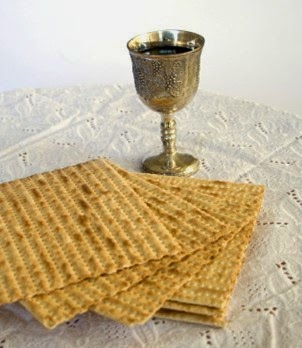
Seder bread and wine.
Passover
Moses has a legacy in Christianity through the observance of the Eucharist. The Eucharist, or "Last Supper" was the passover meal of Judaism and Jesus used it to inaugurate a memorial for His own sacrifice which was coming at the instigation of the Jews and the hands of the Romans on the Cross. The Eucharist comes, therefore, from the last of the ten plagues visited upon Egypt in which the first-born son of every Egyptian household died. The Hebrews, to avert this tragedy coming upon them, marked their door lintels with blood from a sacrificed lamb. Thereby, the Lord God "passed over" the homes of those obedient to the commands of God through Moses and their children survived the night.
The lamb, which was sacrificed by every Hebrew household, and its blood used to save the Hebrews from the passing over of the Lord God, is thus a symbol for Jesus Christ, often titled "Lamb of God" ("Agnus Dei") Who offered His blood to likewise save His followers from the condemnations of sin. In this role, Jesus is often symbolized in Christian symbology as a perfect lamb.
The story of the passover is a lengthy one starting in Exodus 7 and extending through Exodus 12. It is the final plague of ten plagues visited upon the Egyptians. This age of the Egyptians of Moses' time was a cruel one and the plagues are correspondingly harsh. It is a measure of the hardheartedness of the times that such measures failed, until the passover, to cause the Pharaoh to release the Hebrews from their slavery. Even then, the Pharaoh fell back on his decision and pursued the departing Hebrews to the Red Sea where his army was destroyed.
The following passages from Exodus name each plague. It is an interesting aside that some scholars have noted a correspondence between each plague and one of the principle gods of the Egyptians, the lesson being in the emasculating of each god in turn.
"And the LORD spake unto Moses, 'Say unto Aaron, Take thy rod, and stretch out thine hand upon the waters of Egypt, upon their streams, upon their rivers, and upon their ponds, and upon all their pools of water, that they may become blood; and that there may be blood throughout all the land of Egypt, both in vessels of wood, and in vessels of stone.' And Moses and Aaron did so, as the LORD commanded; and he lifted up the rod, and smote the waters that were in the river, in the sight of Pharaoh, and in the sight of his servants; and all the waters that were in the river were turned to blood." (Exodus 7:19-20)
"And the LORD spake unto Moses, 'Say unto Aaron, Stretch forth thine hand with thy rod over the streams, over the rivers, and over the ponds, and cause frogs to come up upon the land of Egypt.' And Aaron stretched out his hand over the waters of Egypt; and the frogs came up, and covered the land of Egypt." (Exodus 8:5-6)
"And the LORD said unto Moses, 'Say unto Aaron, Stretch out thy rod, and smite the dust of the land, that it may become lice throughout all the land of Egypt.' And they did so; for Aaron stretched out his hand with his rod, and smote the dust of the earth, and it became lice in man, and in beast; all the dust of the land became lice throughout all the land of Egypt." (Exodus 8:16-17)
"'And I will sever in that day the land of Goshen, in which my people dwell, that no swarms of flies shall be there; to the end thou mayest know that I am the LORD in the midst of the earth. And I will put a division between my people and thy people: to morrow shall this sign be.' And the LORD did so; and there came a grievous swarm of flies into the house of Pharaoh, and into his servants' houses, and into all the land of Egypt: the land was corrupted by reason of the swarm of flies." (Exodus 8:22-24)
"'Behold, the hand of the LORD is upon thy cattle which is in the field, upon the horses, upon the asses, upon the camels, upon the oxen, and upon the sheep: there shall be a very grievous murrain. And the LORD shall sever between the cattle of Israel and the cattle of Egypt: and there shall nothing die of all that is the children's of Israel.' And the LORD appointed a set time, saying, 'Tomorrow the LORD shall do this thing in the land.' And the LORD did that thing on the morrow, and all the cattle of Egypt died: but of the cattle of the children of Israel died not one." (Exodus 9:3-6)
"And they took ashes of the furnace, and stood before Pharaoh; and Moses sprinkled it up toward heaven; and it became a boil breaking forth with blains upon man, and upon beast." (Exodus 9:10)
"And Moses stretched forth his rod toward heaven: and the LORD sent thunder and hail, and the fire ran along upon the ground; and the LORD rained hail upon the land of Egypt. So there was hail, and fire mingled with the hail, very grievous, such as there was none like it in all the land of Egypt since it became a nation." (Exodus 9:23-24)
"And the LORD said unto Moses, 'Stretch out thine hand over the land of Egypt for the locusts, that they may come up upon the land of Egypt, and eat every herb of the land, even all that the hail hath left.' And Moses stretched forth his rod over the land of Egypt, and the LORD brought an east wind upon the land all that day, and all that night; and when it was morning, the east wind brought the locusts. And the locust went up over all the land of Egypt, and rested in all the coasts of Egypt: very grievous were they; before them there were no such locusts as they, neither after them shall be such." (Exodus 10:12-14)
"And the LORD said unto Moses, 'Stretch out thine hand toward heaven, that there may be darkness over the land of Egypt, even darkness which may be felt.' And Moses stretched forth his hand toward heaven; and there was a thick darkness in all the land of Egypt three days: They saw not one another, neither rose any from his place for three days: but all the children of Israel had light in their dwellings." (Exodus 10:21-23)
"And the LORD spake unto Moses and Aaron in the land of Egypt saying, 'This month shall be unto you the beginning of months: it shall be the first month of the year to you. Speak ye unto all the congregation of Israel, saying, In the tenth day of this month they shall take to them every man a lamb, according to the house of their fathers, a lamb for an house: And if the household be too little for the lamb, let him and his neighbour next unto his house take it according to the number of the souls; every man according to his eating shall make your count for the lamb.'
"'Your lamb shall be without blemish, a male of the first year: ye shall take it out from the sheep, or from the goats: And ye shall keep it up until the fourteenth day of the same month: and the whole assembly of the congregation of Israel shall kill it in the evening. And they shall take of the blood, and strike it on the two side posts and on the upper door post of the houses, wherein they shall eat it. And they shall eat the flesh in that night, roast with fire, and unleavened bread; and with bitter herbs they shall eat it. Eat not of it raw, nor sodden at all with water, but roast with fire; his head with his legs, and with the purtenance thereof. And ye shall let nothing of it remain until the morning; and that which remaineth of it until the morning ye shall burn with fire. And thus shall ye eat it; with your loins girded, your shoes on your feet, and your staff in your hand; and ye shall eat it in haste: it is the LORD's passover. For I will pass through the land of Egypt this night, and will smite all the firstborn in the land of Egypt, both man and beast; and against all the gods of Egypt I will execute judgment: I am the LORD. And the blood shall be to you for a token upon the houses where ye are: and when I see the blood, I will pass over you, and the plague shall not be upon you to destroy you, when I smite the land of Egypt. And this day shall be unto you for a memorial; and ye shall keep it a feast to the LORD throughout your generations; ye shall keep it a feast by an ordinance for ever.'" (Exodus12:1-14)
"'Your lamb shall be without blemish, a male of the first year: ye shall take it out from the sheep, or from the goats: And ye shall keep it up until the fourteenth day of the same month: and the whole assembly of the congregation of Israel shall kill it in the evening. And they shall take of the blood, and strike it on the two side posts and on the upper door post of the houses, wherein they shall eat it. And they shall eat the flesh in that night, roast with fire, and unleavened bread; and with bitter herbs they shall eat it. Eat not of it raw, nor sodden at all with water, but roast with fire; his head with his legs, and with the purtenance thereof. And ye shall let nothing of it remain until the morning; and that which remaineth of it until the morning ye shall burn with fire. And thus shall ye eat it; with your loins girded, your shoes on your feet, and your staff in your hand; and ye shall eat it in haste: it is the LORD's passover. For I will pass through the land of Egypt this night, and will smite all the firstborn in the land of Egypt, both man and beast; and against all the gods of Egypt I will execute judgment: I am the LORD. And the blood shall be to you for a token upon the houses where ye are: and when I see the blood, I will pass over you, and the plague shall not be upon you to destroy you, when I smite the land of Egypt. And this day shall be unto you for a memorial; and ye shall keep it a feast to the LORD throughout your generations; ye shall keep it a feast by an ordinance for ever.'" (Exodus12:1-14)
"And the children of Israel went away, and did as the LORD had commanded Moses and Aaron, so did they. And it came to pass, that at midnight the LORD smote all the firstborn in the land of Egypt, from the firstborn of Pharaoh that sat on his throne unto the firstborn of the captive that was in the dungeon; and all the firstborn of cattle. And Pharaoh rose up in the night, he, and all his servants, and all the Egyptians; and there was a great cry in Egypt; for there was not a house where there was not one dead." (Exodus 12:28-30)
.
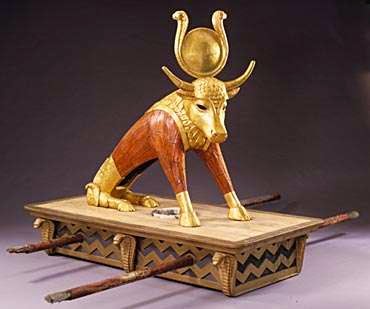
Golden calf.
Graven Image
The role of Moses as an intermediary is exemplified in the story of the golden calf. The role of the Manifestation of God as voice of God to the people and voice of people to God is illustrated in their interaction over the transgressions of Israel. "And Moses turned, and went down from the mount, and the two tables of the testimony were in his hand: the tables were written on both their sides; on the one side and on the other were they written. And the tables were the work of God, and the writing was the writing of God, graven upon the tables.
"And when Joshua heard the noise of the people as they shouted, he said unto Moses, 'There is a noise of war in the camp.' And he said, 'It is not the voice of them that shout for mastery, neither is it the voice of them that cry for being overcome: but the noise of them that sing do I hear.'
"And it came to pass, as soon as he came nigh unto the camp, that he saw the calf, and the dancing: and Moses' anger waxed hot, and he cast the tables out of his hands, and brake them beneath the mount. And he took the calf which they had made, and burnt it in the fire, and ground it to powder, and strawed it upon the water, and made the children of Israel drink of it.
"And it came to pass on the morrow, that Moses said unto the people, 'Ye have sinned a great sin: and now I will go up unto the LORD; peradventure I shall make an atonement for your sin.' And Moses returned unto the LORD, and said, 'Oh, this people have sinned a great sin, and have made them gods of gold. Yet now, if thou wilt forgive their sin -- ; and if not, blot me, I pray thee, out of thy book which thou hast written.'
In this instance, Moses is set aside as the One to intercede for His followers. "And the LORD said unto Moses, 'Whosoever hath sinned against me, him will I blot out of my book. Therefore now go, lead the people unto the place of which I have spoken unto thee: behold, mine Angel shall go before thee: nevertheless in the day when I visit I will visit their sin upon them.' And the LORD plagued the people, because they made the calf, which Aaron made.
Moses is given His guidance through God's words to His "stiffnecked" followers spoken through Moses. "And the LORD said unto Moses, 'Depart, and go up hence, thou and the people which thou hast brought up out of the land of Egypt, unto the land which I sware unto Abraham, to Isaac, and to Jacob, saying, Unto thy seed will I give it: And I will send an angel before thee; and I will drive out the Canaanite, the Amorite, and the Hittite, and the Perizzite, the Hivite, and the Jebusite: Unto a land flowing with milk and honey: for I will not go up in the midst of thee; for thou art a stiffnecked people: lest I consume thee in the way.'
"And when the people heard these evil tidings, they mourned: and no man did put on him his ornaments. For the LORD had said unto Moses, 'Say unto the children of Israel, Ye are a stiffnecked people: I will come up into the midst of thee in a moment, and consume thee: therefore now put off thy ornaments from thee, that I may know what to do unto thee.' And the children of Israel stripped themselves of their ornaments by the mount Horeb. (Exodus 32:15-20, 32:30-33:6)
.
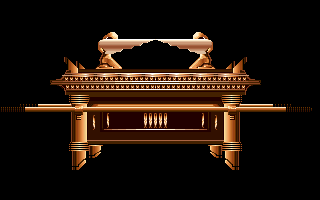
Ark of the Covenant
The Law
We are well familiar with the story of the Ark of the Covenant, constructed at God's command through Moses as a suitable repository for the law of God revealed on Mt. Sinai. From that revelation, Mosaic law emerged and expanded to cover every aspect of life. Through steps in the interaction of God and His people emerged the law, the Torah, and over centuries, the Talmud and the Zohar. We study the first five books of the Bible, the Pentateuch, to learn the beginnings.
The Pentateuch contains the Law of God as set forth in the Days of Moses. It is a standard amongst Jews and Christians for proper conduct down to today. Jesus even told us, "Think not that I am come to destroy the law, or the prophets: I am not come to destroy, but to fulfil." (Matthew 5:17) But immediately thereafter, He showed in His words the spirit of the Law by teaching how the law is to be rendered. He holds forth thusly, laying out law and principles and concludes with, "'Therefore whosoever heareth these sayings of mine, and doeth them, I will liken him unto a wise man, which built his house upon a rock: And the rain descended, and the floods came, and the winds blew, and beat upon that house; and it fell not: for it was founded upon a rock. And every one that heareth these sayings of mine, and doeth them not, shall be likened unto a foolish man, which built his house upon the sand: And the rain descended, and the floods came, and the winds blew, and beat upon that house; and it fell: and great was the fall of it.' And it came to pass, when Jesus had ended these sayings, the people were astonished at his doctrine: For he taught them as one having authority, and not as the scribes." (Matthew 7:24-28)
Jesus' instruction on the law is too lengthy to quote here, but the reader who looks at it, himself, will recognize that while the Law is certainly not destroyed, Jesus certainly changed how the devout should read it.
It is pointed out, for example, by many who study these things, that the ordinance regarding "an eye for an eye" was not laid down as a formula for vengeance, rather it was a limit set upon the avenger to go no further than taking an eye for an eye lost. It was a principle to limit one's passions. Jesus then took it a step further, saying, "that ye resist not evil" (vs. 39). So it is that the Law evolves from one revelation to another.
Also, there are laws that are simply intended for a different time or place. Some examples of this were recently circulated in a popular, published letter pointing out examples of Old Testament Law that had obviously outlived their usefulness. The following list is derived from that.
Leviticus 25:44 permits ownership of slaves from neighboring nations, specifically "...of the heathen that are round about you..."
Exodus 21:7 permits the selling of our daughters into slavery.
Leviticus 15:19-24 disallows any contact with a woman during menstruation.
Leviticus 1:9 notes that burning a bull on the altar as a sacrifice creates a pleasing odor for the Lord.
Exodus 35:2 prescribes death to one who works on the Sabbath.
Leviticus 21:20-23 forbids anyone with defective sight, indeed of any physical fault, from approaching the altar of God.
Leviticus 19:27 forbids trimming of the hair around the temples of the head.
Leviticus 19:19 forbids planting two different crops in the same field or wearing garments of blended fabric.
Of course, these are just a sampling.
Leviticus 25:44 permits ownership of slaves from neighboring nations, specifically "...of the heathen that are round about you..."
Exodus 21:7 permits the selling of our daughters into slavery.
Leviticus 15:19-24 disallows any contact with a woman during menstruation.
Leviticus 1:9 notes that burning a bull on the altar as a sacrifice creates a pleasing odor for the Lord.
Exodus 35:2 prescribes death to one who works on the Sabbath.
Leviticus 21:20-23 forbids anyone with defective sight, indeed of any physical fault, from approaching the altar of God.
Leviticus 19:27 forbids trimming of the hair around the temples of the head.
Leviticus 19:19 forbids planting two different crops in the same field or wearing garments of blended fabric.
Of course, these are just a sampling.
Abdu'l-Baha tells us, "Let me ask your closest attention in considering this subject. The divine religions embody two kinds of ordinances. First, there are those which constitute essential, or spiritual, teachings of the Word of God. These are faith in God, the acquirement of the virtues which characterize perfect manhood, praiseworthy moralities, the acquisition of the bestowals and bounties emanating from the divine effulgences -- in brief, the ordinances which concern the realm of morals and ethics. This is the fundamental aspect of the religion of God, and this is of the highest importance because knowledge of God is the fundamental requirement of man. Man must comprehend the oneness of Divinity. He must come to know and acknowledge the precepts of God and realize for a certainty that the ethical development of humanity is dependent upon religion. He must get rid of all defects and seek the attainment of heavenly virtues in order that he may prove to be the image and likeness of God. It is recorded in the Holy Bible that God said, "Let us make man in our image, after our likeness." It is self-evident that the image and likeness mentioned do not apply to the form and semblance of a human being because the reality of Divinity is not limited to any form or figure. Nay, rather, the attributes and characteristics of God are intended. Even as God is pronounced to be just, man must likewise be just. As God is loving and kind to all men, man must likewise manifest loving-kindness to all humanity. As God is loyal and truthful, man must show forth the same attributes in the human world. Even as God exercises mercy toward all, man must prove himself to be the manifestation of mercy. In a word, the image and likeness of God constitute the virtues of God, and man is intended to become the recipient of the effulgences of divine attributes. This is the essential foundation of all the divine religions, the reality itself, common to all. Abraham promulgated this; Moses proclaimed it. Christ and all the Prophets upheld this standard and aspect of divine religion.
"Second, there are laws and ordinances which are temporary and nonessential. These concern human transactions and relations. They are accidental and subject to change according to the exigencies of time and place. These ordinances are neither permanent nor fundamental... These are nonessential, temporary laws. In the Holy Bible there are certain commandments which according to those bygone times constituted the very spirit of the age, the very light of that period. For example, according to the law of the Torah if a man committed theft of a certain amount, they cut off his hand. Is it practicable and reasonable in this present day to cut off a man's hand for the theft of a dollar? In the Torah there are ten ordinances concerning murder. Could these be made effective today? Unquestionably no; times have changed. According to the explicit text of the Bible if a man should change or break the law of the Sabbath or if he should touch fire on the Sabbath, he must be killed. Today such a law is abrogated. The Torah declares that if a man should speak a disrespectful word to his father, he should suffer the penalty of death. Is this possible of enforcement now? No; human conditions have undergone changes. Likewise, during the time of Christ certain minor ordinances conformable to that period were enforced." (The Promulgation of Universal Peace, pp. 403-404)
.
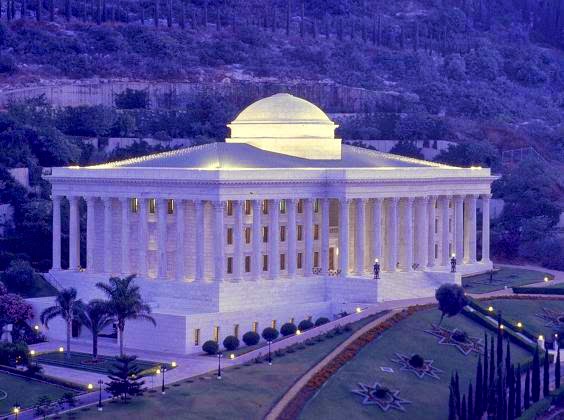
Seat of the Universal House of Justice
The Ark
The word "ark" in the Bible relates to two Hebrew words; aron, which means a chest or casket or coffin, and tebah, which means a boat or similar vessel. The basket in which the baby Moses was placed by His mother was a tebah. Likewise the ark of Noah was a tebah. The ark of the covenant of Moses was an aron and might be considered apart from Noah's ark, although both are containers of a kind. This commonality is suggested by this observation from translaters: In the Hebrew Scriptures tebah is the word used for Noah's Ark. But the phrase , 'Ark of the Covenant' is translated from noe'aron ha-berith. Aron is a near synonym of tebah but means a large container larger like a large chest, cabinet or similar. When the Greeks translated the Hebrew scripture, they use the word kibotos (vessel) for both words.
This word appears often in the writings of Baha'u'llah. Notable is this example from His "Tablet of Carmel" in which He addresses the Mountain of Carmel saying, "Call out to Zion, O Carmel, and announce the joyful tidings: He that was hidden from mortal eyes is come! His all-conquering sovereignty is manifest; His all-encompassing splendor is revealed. Beware lest thou hesitate or halt. Hasten forth and circumambulate the City of God that hath descended from heaven, the celestial Kaaba round which have circled in adoration the favored of God, the pure in heart, and the company of the most exalted angels... Verily this is the Day in which both land and sea rejoice at this announcement, the Day for which have been laid up those things which God, through a bounty beyond the ken of mortal mind or heart, hath destined for revelation. Ere long will God sail His Ark upon thee, and will manifest the people of Baha who have been mentioned in the Book of Names." (Baha'u'llah, Gleanings from the Writings of Baha'u'llah, p. 15)
Great significance is given this passage because on the slopes of that very mountain, in the vicinity in which Baha'u'llah revealed the Tablet of Carmel, stands the Seat of the Universal House of Justice. This structure houses the Supreme Institution of the Baha'i Faith, provided for in Baha'u'llah's writings and the source from which God's law is expounded in the world in our age.
This modern Ark can be understood in the words of Isaiah who foresaw it in these words: "And it shall come to pass in the last days, that the mountain of the LORD's house shall be established in the top of the mountains, and shall be exalted above the hills; and all nations shall flow unto it. And many people shall go and say, Come ye, and let us go up to the mountain of the LORD, to the house of the God of Jacob; and he will teach us of his ways, and we will walk in his paths: for out of Zion shall go forth the law, and the word of the LORD from Jerusalem." (Isaiah 2:2-3). this Jerusalem (meaning, "Abode of Peace) may be recognized in terms of the "New Jerusalem" descended from heaven in the Revelation of St. John the Divine 3:12 and 21:2), in the day described by Isaiah in his book: "They shall not hurt nor destroy in all my holy mountain: for the earth shall be full of the knowledge of the LORD, as the waters cover the sea." (Isaiah 11:9)
In every depiction of the Ark of the Covenant, two angels are seen surmounting the chest. They are explained in Exodus in God's instructions to Moses: "'And thou shalt make a mercy seat of pure gold: two cubits and a half shall be the length thereof, and a cubit and a half the breadth thereof. And thou shalt make two cherubims of gold, of beaten work shalt thou make them, in the two ends of the mercy seat. And make one cherub on the one end, and the other cherub on the other end: even of the mercy seat shall ye make the cherubims on the two ends thereof. And the cherubims shall stretch forth their wings on high, covering the mercy seat with their wings, and their faces shall look one to another; toward the mercy seat shall the faces of the cherubims be. And thou shalt put the mercy seat above upon the ark; and in the ark thou shalt put the testimony that I shall give thee. And there I will meet with thee, and I will commune with thee from above the mercy seat, from between the two cherubims which are upon the ark of the testimony, of all things which I will give thee in commandment unto the children of Israel.'"(Exodus, 25:17-22)
Moses was hereby given the seat of authority over Israel by communion with God. Some will see in this the work of the Holy Spirit as it was in the days of Jesus and in the day of Pentecost after Jesus' crucifixion. Here also is a description of the authority of the Universal House of Justice in its workings and actions in the Seat of the Universal House of Justice on Mt. Carmel. In obedience to Baha'u'llah's provision and instruction, that Supreme Institution, by prayer and consultation of its members, is guided by God.
